

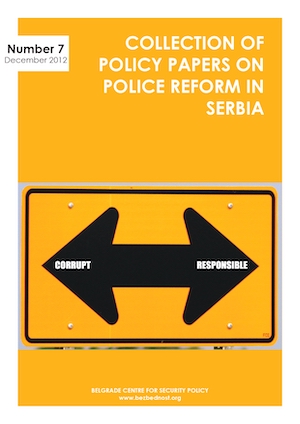
Manifestations of police corruption may be different and they are varying from those with less harmless consequences to those considered as criminal offences under the law. Successful prevention and suppression of corruption requires the establishment of police service control mechanisms and identification of corruption risks. In Serbia, the coherent system of internal oversight of the police is not functioning and this system together with the institutions for external oversight and control ensures that the police act according to the set rules and at the same time increases the accountability and integrity of police officers. This situation leads to increased opportunities for corruption. Consequently, the citizens’ confidence in the police is lower. Additionally, there is no clear list of corruption risks in the police. Therefore, the aim of the policy study is to fill this gap. First of all, the paper identifies the importance of external and internal oversight of the police in preventing and suppressing police corruption. Internal and external controllers play a significant role in eliminating corruption risks which are addressed in the second part of the paper based on typology of police corruption risks drafted by Transparency International. However, for a successful fight against police corruption it is necessary to eliminate deficiencies in the police internal control authorities and in external oversight institutions, which will be presented in the third and the fourth part of the paper. Finally, the paper presents guidelines for improving the fight against police corruption.
More...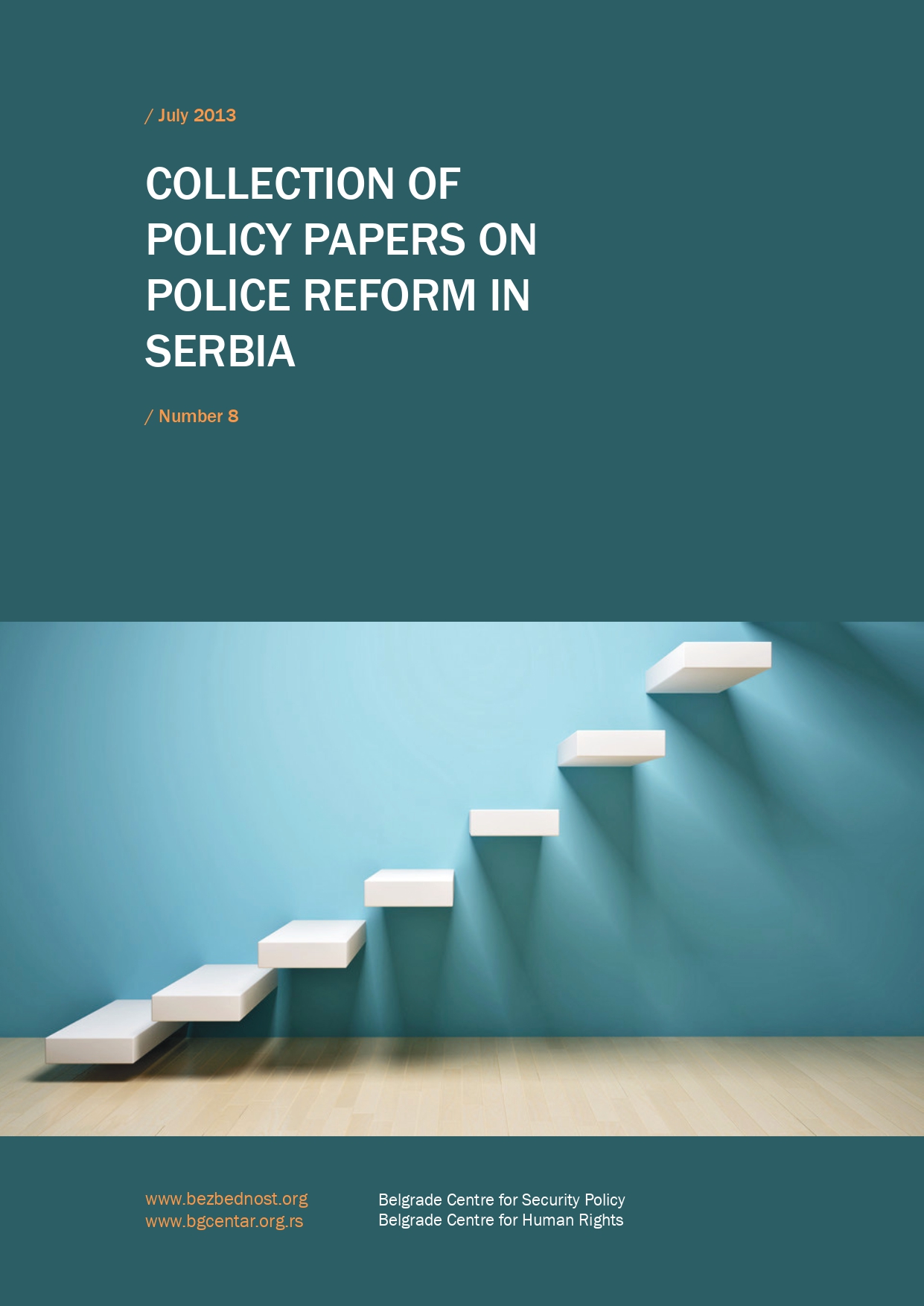
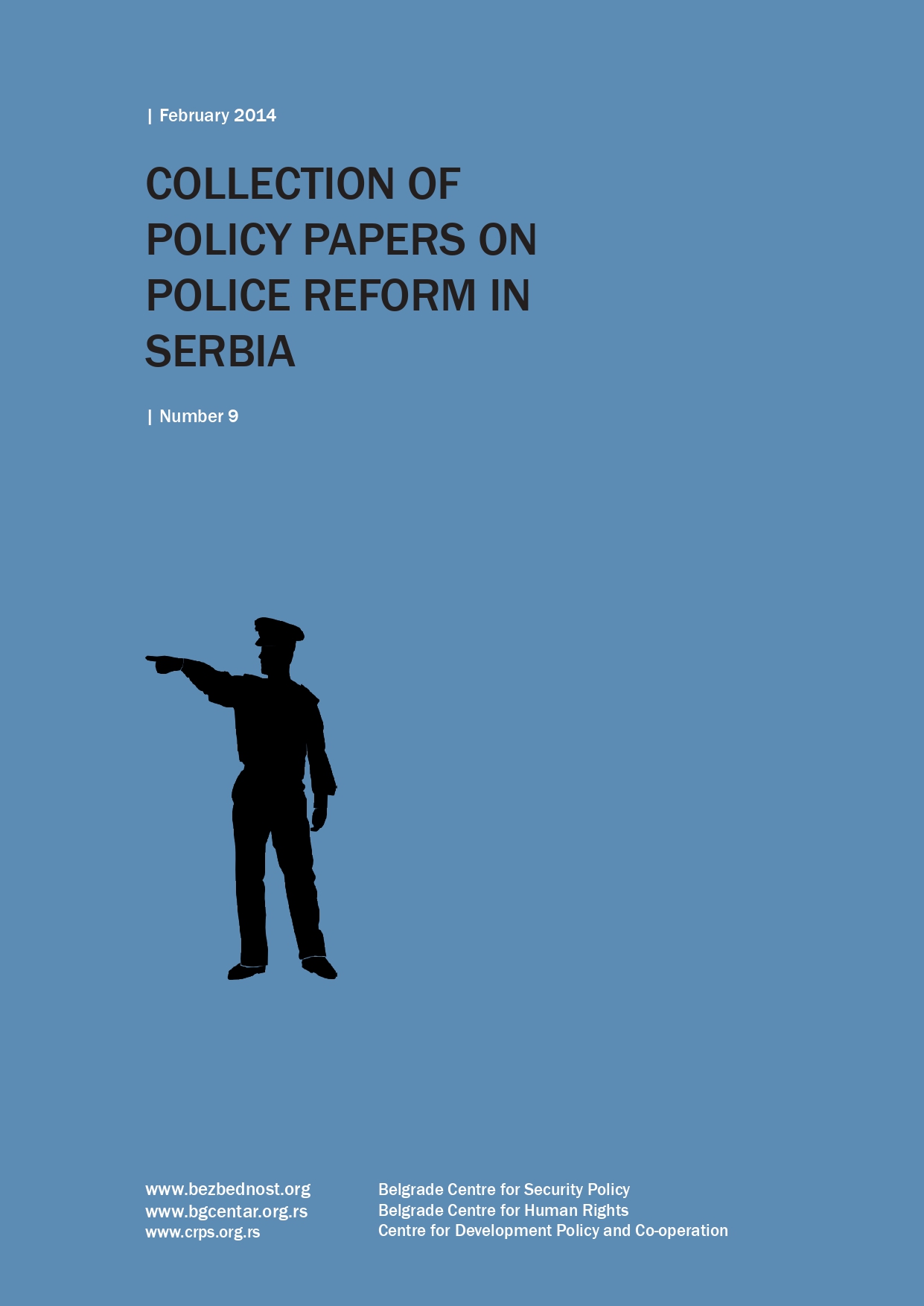

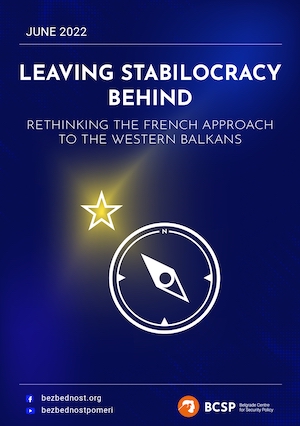
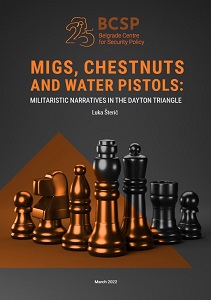
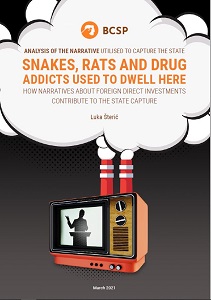
Foreign direct investments are the cornerstone of the current government’s economic policy. In their statements, the officials call them drivers of development, saying that they have enabled the revival of the economy and turned Serbia into the “economic tiger of Southeast Europe.”1 The fact that the value of the investments Serbia has managed to attract is greater “than what was achieved by all the countries of the Western Balkans put together” 2 is often mentioned as the key measure of success. However, the story of brilliant success quickly loses its lustre when one considers the long-term effects and all-encompassing consequences of this policy. Due to the way they are contracted and implemented, foreign direct investments represent one of the key mechanisms for capturing the state. Hiding behind the stories of a better future and new jobs, the government is breaking down the system of legal regulations and statutory procedures, promoting private interest to the detriment of the public one, and using foreign investments as propaganda ammunition to legitimise unlimited power. The results of such policy are a number of negative consequences for the state and the citizens, such as the increase of public debt, dramatic violation of workers’ rights and alarming problems with environmental pollution. In order to mask the negative consequences and legitimise the policy of attracting foreign investors based on the above described pattern, a complex narrative has been developed presenting foreign investments as a successful, and the only possible, model for state development. This meta-narrative about progress, which media are building up every day, is based on four basic component narratives: on the economic revival, on the efficiency of personal rule, on transparent contracts and on the opponents of Serbia’s development who ‘unfoundedly’ criticise the government’s economic success. In the analysis of the narrative we will focus on the statements of officials made since2012, which is when the regime led by the Serbian Progressive Party came to power. Many of the described mechanisms, such as non-transparent, harmful contracts and unjustifiably high subsidies, also existed during the previous government.3 However, the capture of the state, carried out - among other things - with the help of foreign direct investments, has reached completely new dimensions under the current regime, while the narratives that accompany it have been significantly ‘improved’.
More...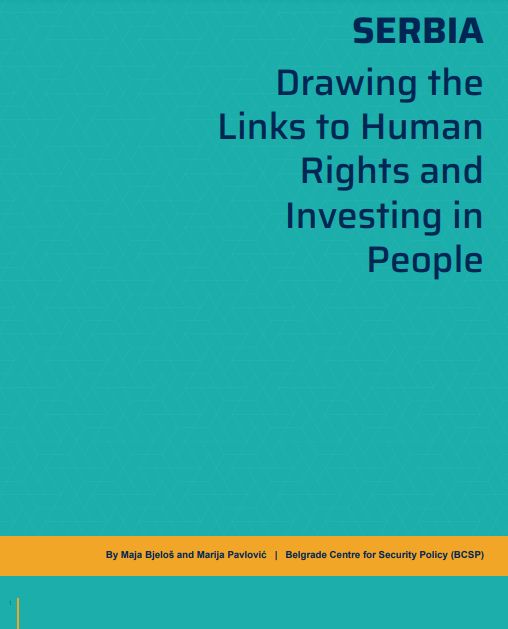
Keywords: Cyber attacks; Cybercrime; Information and Communication Technology; Privacy violations; Human rights; Biometric surveillance; Democracy; Internet fraud; Identity theft
Cybercrime and cybersecurity have become critical issues in Serbia, reflecting a global trend of increasing cyber threats. In 2020, Serbia experienced approximately 26 million significant cyberattacks, including unauthorized data collection and intrusions into ICT systems. Citizens also faced severe violations of privacy, an uptick in attacks on human rights defenders, and challenges related to emerging technologies like biometric surveillance. Public concerns highlight the risk of these technologies being misused against citizens amid democratic backsliding. Recent incidents, such as internet fraud targeting major institutions and a cyberattack on Serbia's cadastre, underscore the urgent need for robust cybersecurity measures. Despite advances in the legal framework—anchored by the 2016 Law on Information Security and aligned with EU standards—implementation lags behind the evolving threats. Serbia’s cybersecurity landscape includes provisions for protecting critical infrastructure and digital networks while addressing cybercrime through international conventions like the Budapest Convention. The Belgrade Centre for Security Policy conducted a baseline analysis and interviews with stakeholders in early 2022 to evaluate the effectiveness of Serbia’s institutional and legal response to cybersecurity challenges. Although the country has made significant progress in legislative development, the enforcement of these measures remains insufficient to address the growing complexity of cyber threats. The report emphasizes the necessity for the state to uphold human rights and the rule of law while enhancing its capacity to combat cybersecurity risks effectively.
More...
Keywords: Procurement; police; Ministry of Internal Affairs
The Ministry of Internal Affairs in Serbia plans to spend 8% of the budget (about six billion dinars) for the procurement of much-needed equipment, uniforms, and technology and to invest in the development of police capacities. Purposeful spending of these funds will significantly improve the work of the police and improve the safety of citizens. That is why it is important to wisely plan and spend every dinar. Improving the expediency of public procurement implies improving efficiency, effectiveness and economy in tenders.
More...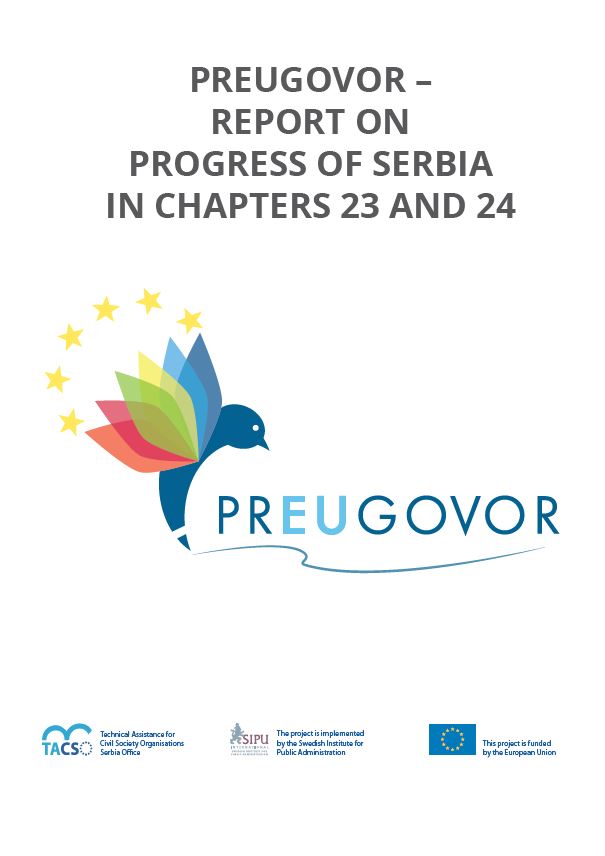
Keywords: PrEUgovor; . prEUnup; European Union; Serbia; international relations; EU integrations
Over the past six months, the coalition PrEUgovor has been monitoring the state of play regarding the key policy areas in the process of Serbia’s accession to the EU. These areas include the political criteria and policies covered under chapters 23 and 24 of the European acquis in the negotiation process. The monitored period was marked by two key events: the release of Screening Reports for chapters 23 and 24 by the European Commission, and drafting of the Action Plans for these two chapters. Additionally, the Progress Report for Serbia for 2014 was released by the EC in October, so this report is envisaged as a commentary and an update to this document. This report presents concrete case studies, well researched and documented by the coalition’s members, in order to illustrate problems in the areas covered. Lastly, it also contains comments on the Action Plan draft for chapter 23. Generally, the progress in the areas covered by the PrEUgovor report can best be described as uneven and erratic. When it comes to normalization of relations between Serbia and Kosovo no progress was achieved, mostly due to elections and the inability to form the government in Pristina. Although there was change in legislation regarding civilian oversight of the security sector, the opportunity to systematically regulate this area was missed. The area of the fight against corruption witnessed partial progress with the adoption of new regulations, although the opportunity was missed to fulfil anti-corruption goals to a greater extent. In the area of the protection of women from gender-based violence, protection of children and protection of the victims of violence there was no further progress. In the migration and asylum policy areas no substantial progress was achieved. The same goes for the fight against human trafficking where there still exist numerous obstacles on the path towards full harmonization of domestic legal system with the European standards.
More...
Keywords: European Union; EU accession; Serbia; international relations
With a view to preparing the next meeting of the Accession Conference with Serbia, the Working Party on Enlargement and Countries Negotiating Accession to the EU has reached agreement on a draft European Union common position on Judiciary and fundamental rights. In this light, and in line with the internal arrangements for the negotiations with Serbia (doc. 17977/13), the Permanent Representatives' Committee is invited to adopt the common position as set out in the Annex. Following adoption by the Permanent Representatives' Committee, the EU common position will be made available to Serbia before the next meeting of the Accession Conference.
More...
Keywords: European Union; EU accession; Serbia; international relations
This position of the European Union is based on its general position for the Accession Conference with Serbia (CONF-RS 1/14), and is subject to the negotiating principles endorsed therein, in particular: any view expressed by either Serbia or the EU on a specific chapter of the negotiations will in no way prejudge the position which may be taken on other chapters; agreements reached in the course of negotiations on specific chapters, even partial ones, may not be considered as final until an overall agreement has been reached for all chapters; as well as to the requirements set out in points 23, 24, 28, 42, 43, 44 and 48 of the Negotiating Framework. The EU encourages Serbia to continue the process of alignment with the acquis and its effective implementation and enforcement, and in general to develop already before accession, policies and instruments as close as possible to those of the European Union. The EU notes that Serbia, in its negotiating position (CONF-RS 3/16) accepts the acquis under chapter 24 as in force on 1 January 2016 and that it will be ready to implement it by the date of its accession to the European Union.
More...
Keywords: Serbia; Egypt; security; security sector reform
More...
Keywords: Special investigative measures; security; Security Information Agency; BIA; Military Security Agency; MSA
Special investigative measures (SIM) are measures covertly applied by state institutions (foremost security institutions), which inherently constrict the degree to which citizens enjoy their constitutionally guaranteed rights. These fundamental traits of SIM mean that uncontrolled implementation may lead to undue violation of human rights, abuse of power, and it may unnecessarily cost taxpayers significant amounts of money. These risks are not purely “theoretical”. In recent years, there were several scandals in Serbia involving the use of SIM. In 2012 and 2013 the public was shaken by media reports of phone tapping of high state officials. In early 2014, former deputy head of the Police unit responsible for SIM implementation was arrested for having leaked information to an organised criminal group on measures implemented against its members. Apart from these scandals, there are also indications that SIM are amply implemented by institutions. For instance, one mobile operator reported that public institutions made 270,000 accesses to retained electronic data of its customers within one year.1 All of this suggests there is a need for strengthening external oversight, which is essential for increasing the accountability of state actors implementing SIM. Strengthening external oversight is also in the best interest of security institutions, as it helps demystify their work and enhance public trust towards these institutions.
More...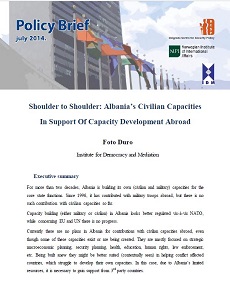
Keywords: Albania; civilian capacitites;
For more than two decades, Albania is building its own (civilian and military) capacities for the core state functions. Since 1996, it has contributed with military troops abroad, but there is no such contribution with civilian capacities so far. Capacity building (either military or civilian) in Albania looks better regulated vis-à-vis NATO, while concerning EU and UN there is no progress. Currently there are no plans in Albania for contributions with civilian capacities abroad, even though some of these capacities exist or are being created. They are mostly focused on strategic macroeconomic planning, security planning, health, education, human rights, law enforcement, etc. Being built anew they might be better suited (contextually seen) in helping conflict affected countries, which struggle to develop their own capacities. In this case, due to Albania’s limited resources, it is necessary to gain support from 3 rd party countries. Due to ethnic and cultural links, Albania’s contribution to Kosovo capacity development looks more feasible. In this case, working “shoulder to shoulder”, a term that has a strong emotional effect in population of both countries, can produce fast and tangible effects. Given the actual situation, it is necessary for the Government of Albania to take concrete actions in assessing the capacities in place and the ones which are more reasonable to be built, supported by the adequate implementation measures, with the right level of comprehensiveness, in partnership with private initiatives. Part of these efforts should be asking for support from third party countries/international institutions.
More...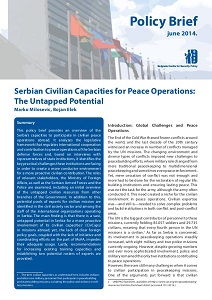
Keywords: Civilian Capacities; Serbian; civilian peace operations
This policy brief provides an overview of the Serbia’s capacities to participate in civilian peace operations abroad. It analyzes the legislative framework that regulates international cooperation and contribution to peace operations of the Serbian defense forces and, based on interviews with representatives of state institutions, it identifies the key practical challenges these institutions are facing in order to create a more conducive environment for a more proactive civilian contribution. The roles of relevant stakeholders, the Ministry of Foreign Affairs, as well as the Serbian Armed Forces and the Police are examined, including an initial overview of the untapped civilian resources from other branches of the Government. In addition to this, potential pools of experts for civilian mission are identified in the civil society sector and among the staff of the international organizations operating in Serbia. The main finding is that there is a vast, untapped potential in Serbia for a more proactive involvement of its civilian capacities1 in missions abroad; yet, the lack of clear foreign policy goals, coupled with the lack of initiative and coordinating efforts on the part of MoFA, impedes their adequate usage. Lastly, recommendations for increasing existing training capacities and establishing two potential rosters of experts are provided.
More...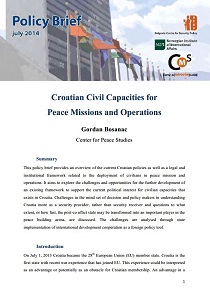
Keywords: Croatia; Civil Capacities; civilian peace operations
This policy brief provides an overview of the current Croatian policies as well as a legal and institutional framework related to the deployment of civilians in peace mission and operations. It aims to explore the challenges and opportunities for the further development of an existing framework to support the current political interest for civilian capacities that exists in Croatia. Challenges in the mind set of decision and policy makers in understanding Croatia more as a security provider, rather than security receiver and questions to what extent, or how fast, the post-co nflict state may be transformed into an important player in the peace building arena, are discussed. The challenges are analysed through state implementation of international development cooperation as a foreign policy tool.
More...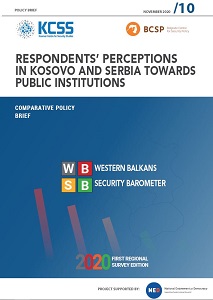
Keywords: Serbia; Kosovo; public institutions; corruption
This overview is one of the outputs of the regional project “Western Balkans Security Barometer” (WBSB), led by the Kosovar Centre for Security Studies (KCSS) in partnership with the Belgrade Centre for Security Policy (BCSP) in Serbia. Bearing in mind the complexities and the ongoing political dialogue between Kosovo and Serbia that could potentially lead to resolution, the project was initiated by launching the first regional survey targeting both countries. This edition of the WBSB presents the findings of this survey conducted simultaneously in Kosovo and Serbia in SeptemberOctober 2020. Both organisations, KCSS and BCSP, have published their respective country reports , in which data on the following issues: i) trust in security, justice, central and local institutions in Kosovo and Serbia, ii) frequency of respondents’ direct contact with principal security and justice institutions in Kosovo and Serbia, and iii) respondents’ perceptions on the pervasiveness of corruption in key institutions in Kosovo and Serbia, are analysed and quantitatively interpreted. This comparative policy brief is intended as an overview of the key findings of both country reports, and serves as a tool to compare Kosovar and Serbian respondents’ perceptions on public institutions. The key findings in terms of trust, perception of corruption and frequency of contact in public institutions by citizens of both countries respectively, are as follow: Overall, in Kosovo the security institutions seem to enjoy the highest levels of public trust followed by municipalities while in Serbia it is the central institutions followed by security institutions that resulted the most trusted.
More...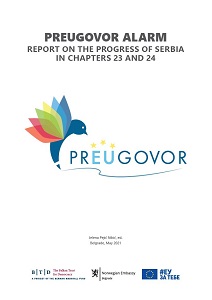
Keywords: PrEUgovor; prEUnup; European Union; Serbia; internatioanl relations; EU integration
This report contains the prEUgovor coalition’s assessment of the political criteria for the EU accession process and the fulfilment of criteria for selected policy areas from Chapters 23 and 24 for the period October 2018 – March 2019. The key finding is that recent developments can hardly be assessed as positive; moreover, it seems that the overall tendencies in the monitored fields show worrying and in some cases alarming signals. The government continued the practice of abuse of public resources during the election periods, while the executive and the ruling majority continuously deprived the Parliament of its legitimate functions. Another worrying fact is the increasing number of laws that are being passed by urgent procedure and in most cases without any public debate. These practices have led to an alarming consequence – namely, the opposition has left the Parliament. Besides the above, the authorities keep undermining the work of independent control institutions by systematically ignoring their recommendations. Once again, we have an atmosphere in which non-governmental organisations are declared enemies and traitors; they are left out of all the dialogues and are not welcome in the solving of social problems. At the same time, the government is creating its own NGOs (GONGOs). Relations with the neighbouring countries have deteriorated, while the people in Serbia are not provided with relevant information about the status of the solution to the issue of Kosovo. Moreover, they are often confused with contradictory statements made by key state officials. Not only is there no progress in the dialogue or bilateral relations, but the current narrative is actually more reminiscent of that which was used in the turbulent decades of the past than the constructive political dialogue of the 21st century. The fight against corruption is at a very low level, threatening to become a mere simulation that is activated only periodically so that the authorities can easily score some cheap political points. Furthermore, there is a real danger that the very same mechanism (Law on Investigation of Property Origin) could be used against the opposition. Also, there are enormous problems with the potential consequences of the proposed constitutional amendments related to the judiciary, as well as a series of laws that are about to enter parliamentary procedure. Generally speaking, the commitments made in the existing Action Plans for Chapters 23 and 24 are fulfilled inconsistently, while the deadlines are postponed on a regular basis. Well-known problems with the non-implementation of the existing acts and laws are still present. Having in mind the fact that two crucial EU issues to be addressed are the Rule of Law and the fight against corruption, lack of concrete results in these two areas is still a major alarming obstacle in Serbia’s process of integration. The majority of the key findings expressed in this report coincide with the lowered ratings that were given to Serbia by various international actors (Freedom House, for instance), thus confirming the alarming developments in the areas covered by Chapters 23 and 24.
More...